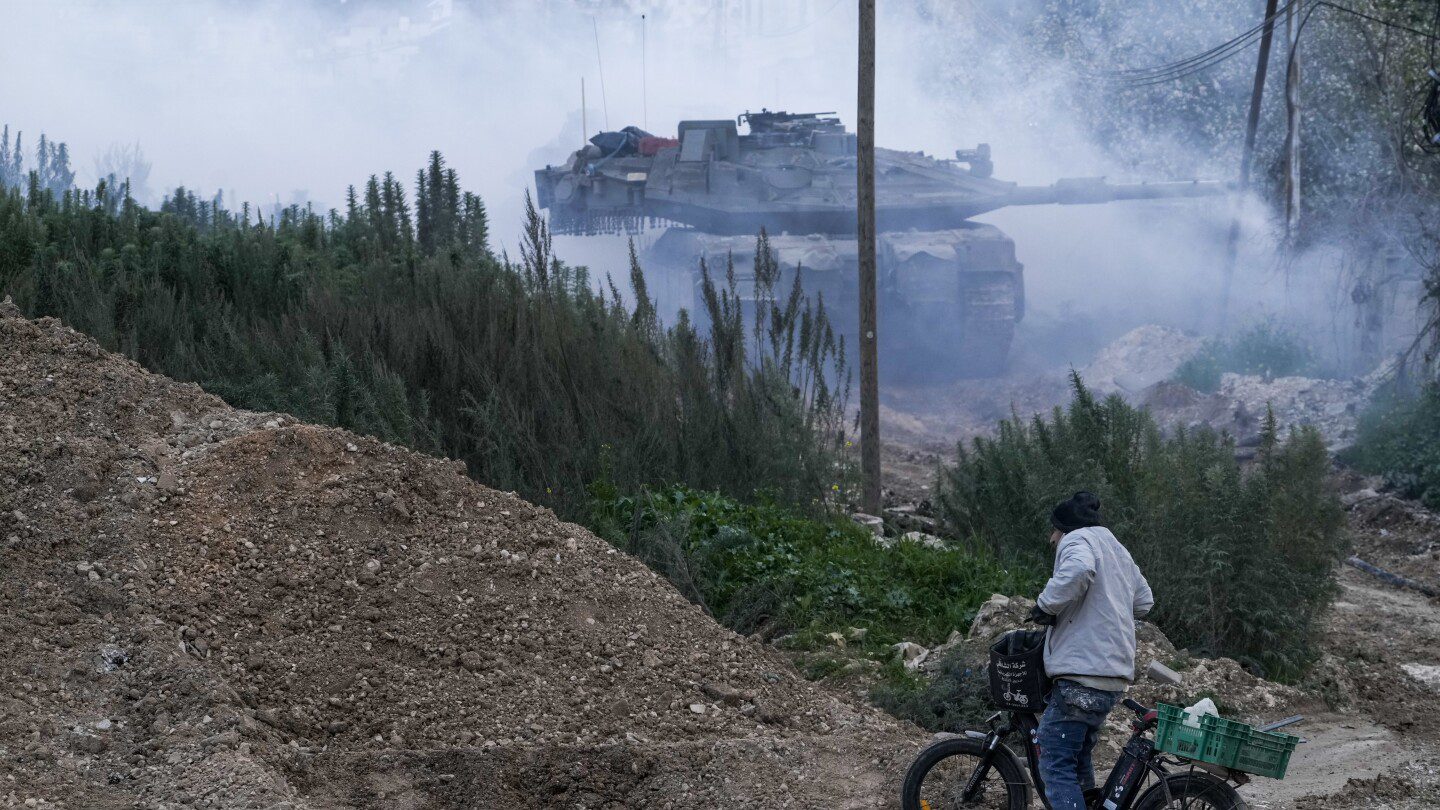
JENIN, West Bank (AP) — For the first time since 2002, Israeli tanks have entered the occupied West Bank following remarks from the defense minister stating that troops will remain in certain regions “for the coming year” and suggesting that displaced Palestinians may not be allowed to return to their homes.
On Sunday, Associated Press reporters observed several tanks rolling into Jenin, a city known for its long-standing resistance against Israeli occupation.
Amid a surge in violence, Israel is intensifying its military operations in the Palestinian territories, asserting its commitment to eliminate militant activities. The current operation began in the northern West Bank on January 21, just days after a ceasefire in Gaza was established, and has now expanded into nearby areas.
Many Palestinians interpret these military incursions as attempts to consolidate Israeli dominance over the region, where approximately 3 million Palestinians live under military authority. These operations have led to significant destruction in urban neighborhoods.
Israeli Defense Minister Israel Katz, along with Prime Minister Benjamin Netanyahu, has ordered increased military activity in West Bank refugee camps, stating that they aim to “intensify efforts to combat terrorism.”
Katz emphasized, “We will not permit the return of residents, nor will we let terrorism re-emerge and flourish.” He previously instructed the military to ready itself for a “prolonged presence” in several urban refugee camps, reporting that around 40,000 Palestinians have fled, leaving these areas “devoid of inhabitants,” a statistic corroborated by the United Nations.
These camps are primarily populated by descendants of Palestinians who either fled or were forcibly removed during conflicts with Israel in the past. It remains uncertain how long these individuals will be barred from returning. Netanyahu indicated that Israeli forces will remain “as long as necessary.”
The last deployment of tanks in the region occurred in 2002 during a severe Palestinian uprising.
The Palestinian foreign ministry has denounced these Israeli actions as “a dangerous escalation” and is urging the international community to intervene against what it describes as illegal “aggression” by Israel.
Netanyahu Faces Pressure to Increase Military Action
According to the interim peace agreements established in the early 1990s, Israel retains authority over large sections of the West Bank, while the Palestinian Authority oversees other areas. Although Israel frequently conducts military operations in Palestinian territories, it typically withdraws afterwards.
The U.N. reports that the current Israeli military campaign is the lengthiest since the Palestinian uprising of the early 2000s.
Violence in the West Bank has escalated amid the ongoing Israel-Hamas conflict in Gaza. While Israel has been conducting targeted raids, Netanyahu faces pressure from far-right coalition partners to assert a harsher stance on militancy in the West Bank, particularly with hostilities in Gaza and Lebanon currently paused.
Since the outbreak of the Gaza conflict on October 7, 2023 – triggered by a Hamas attack on southern Israel – over 800 Palestinians have lost their lives in the West Bank. Israel claims the majority were militants, but many non-combatants, including youths protesting the incursions, have also died. In a recent incident, a pregnant woman was killed.
Additionally, Jewish settlers have engaged in violent actions within Palestinian communities, while retaliatory attacks have surged from the West Bank. Just last Thursday, explosions occurred in three empty buses, suspected to be linked to militant activity.
Israel gained control of the West Bank, Gaza, and East Jerusalem during the 1967 Middle East conflict. Palestinians aspire to establish an independent state encompassing these territories.
U.S. Envoy to Pursue Next Steps in Ceasefire
The recent military actions in the West Bank come at a critical juncture, as the truce between Israel and Hamas in Gaza remains precarious.
As the first week of the ceasefire comes to an end, there appears to be no progress in negotiations for a second phase. The collapse of this ceasefire could trigger renewed hostilities in Gaza, where Netanyahu has indicated that 63 hostages, including a soldier captured in 2014, remain in captivity.
U.S. special envoy for the Middle East, Steve Witkoff, shared with CNN on Sunday that he anticipates moving forward with the next phase of negotiations. He plans to visit the region this week to work towards extending the first phase. His itinerary includes stops in Qatar, Egypt, Israel, the United Arab Emirates, and Saudi Arabia.
On Sunday morning, Israel announced it was delaying the release of hundreds of Palestinian prisoners until they confirm Hamas will cease what Israel terms “humiliating” hostage handovers.
The release of 620 prisoners was expected following the liberation of six Israeli hostages in Gaza on Saturday, yet five of those were freed in staged ceremonies criticized by the U.S. and Red Cross as inhumane.
Family members of the prisoners have expressed their anguish. One mother, Najah Zaqqot, lamented, “What have the prisoners done? We don’t know what happened. They took away our joy.”
In the meantime, Netanyahu has faced renewed backlash regarding the ongoing conflict while addressing a military graduation ceremony. Holding a photograph of Shiri Bibas and her young children, Ariel and Kfir, whose remains were returned from Gaza last week to illustrate “what we are fighting against,” he was met with shouts of “Shame!” and “Why didn’t you save them?” from the audience, to which he did not respond.
___
Reporting from Tel Aviv, Israel, by Goldenberg.
___
Stay updated with AP’s coverage of the ongoing conflict at https://apnews.com/hub/israel-hamas-war









